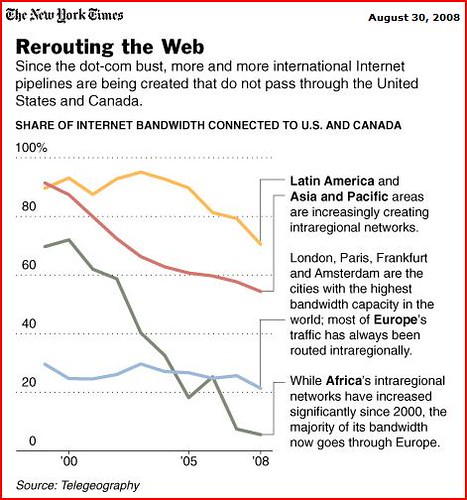Should U.S. businesses involved in Internet commerce do business in nations governed by oppressive regimes? This is a question that many libertarians—including some of us on TLF—have grappled with for some time.
Now Yahoo, Google, and Microsoft have signed on to a set of principles for conducting business in countries that disregard human rights. Today’s Wall Street Journal reports:
Under the new principles, which were crafted over two years, the technology titans promise to protect the personal information of their users wherever they do business and to “narrowly interpret and implement government demands that compromise privacy,” according to the code.
It’s welcome news for defenders of liberty that U.S. Web giants plan to play hardball with foreign governments who would use information gleaned from Internet firms to violate their citizens’ human rights. Several troubling reports have surfac ed in the past few years about American companies abetting egregious actions by oppressive governments. In January, Indian police beat a man whose arrest stemmed from Google’s cooperation with the Indian government. And in 2005, Yahoo gave information to the Chinese government that led to the arrest of a journalist accused of giving out state secrets (the case was later overturned).
ed in the past few years about American companies abetting egregious actions by oppressive governments. In January, Indian police beat a man whose arrest stemmed from Google’s cooperation with the Indian government. And in 2005, Yahoo gave information to the Chinese government that led to the arrest of a journalist accused of giving out state secrets (the case was later overturned).
Continue reading →
Yesterday, the Senate passed S. 602, “The Child Safe Viewing Act of 2007,” which was introduced by Sen. Mark Pryor (D-AR) in February 2007. The bill requires the Federal Communications Commission (FCC) to study the market for “advance blocking technologies” (i.e., parental controls and rating systems) that parents can use to protect their kids from inappropriate content from various sources and platforms. On the surface, the measure seems harmless enough, but in practice, it could have some troubling long-term free speech implications if it leads to more government meddling with parental controls and ratings systems.
The measure requires the FCC to initiate a notice of inquiry to consider measures to examine:
- the existence and availability of advanced blocking technologies that are compatible with various communications devices or platforms;
- methods of encouraging the development, deployment, and use of such technology by parents that do not affect the packaging or pricing of a content provider’s offering; and
- the existence, availability, and use of parental empowerment tools and initiatives already in the market.
That all sounds harmless enough. Indeed, such a study could produce some useful information about the state of the parental controls marketplace. (Of course, I could save them some taxpayer dollars and just send copies of my big Parental Controls & Online Child Safety report to all FCC officials!)
But it’s what comes next in the bill that causes me some heartburn. As part of the review mandated by the bill, S. 602 commands the FCC to “consider advanced blocking technologies that”:
Continue reading →
Just FYI, the latest update of my booklet on “Parental Controls and Online Child Protection: A Survey of Tools & Methods” is now live. The new version, Version 3.1, provides minor updates to all sections of the book and a new appendix of relevant research in the field. I issue major updates early each year and 1 or 2 tweaks during the course of the year to reflect the evolution of the parental control and online child safety market and debate. 
For those not familiar with the report, it explores the market for parental control tools, rating schemes, education efforts, and initiatives aimed at promoting online child safety. I believe that the parental controls and content management tools cataloged in the report represent a better, less restrictive alternative to government regulation. As I conclude after evaluating that state of the market: “There has never been a time in our nation’s history when parents have had more tools and methods at their disposal to help them decide what constitutes acceptable media content in their homes and in the lives of their children.”
The report is available free-of-charge on the PFF website, and the previous editions of the report are housed there too in case you want to see how it has evolved over the past two years. For those interested in taking a quick look at the report, I have embedded it down below the fold as a Scribd file. Finally, as is always the case, I encourage readers to send me updates and suggestions for how to improve the report and I will incorporate them into future versions.
Continue reading →
I posted an essay last month about some possible non-regulatory solutions to the problem of porn on planes that I predicted might develop once airlines started rolling out in-flight Internet access. Some respondants to that essay argued this was likely a non-problem because few people would actually view porn in public. Unfortunately, a few incidents have apparently already created controversy.
Frankly, I am shocked that legislation hasn’t already been floated on this issue, but I am sure that someone in Congress will be firing off something soon. Again, like I said in that previous essay, before things get ugly and bills start flying up on the Hill, the airlines need to think about crafting some constructive solutions to this problem. We don’t want the FCC to become the censors of the sky, as some lawmakers will no doubt propose eventually.
Variations on a theme:
* “The net regards censorship as a failure, and routes around it.” — John Gilmore, SUN Microsystems & EFF co-founder.
* “The net regards hierarchy as a failure, and routes around it.” — Mark Pesce, Writer, consultant, Sydney, Australia
* “The web regards centralization as a failure, and routes around it… by moving to the edge.” — Stowe Boyd, /Message blog
* “The net regards the middleman as a failure, and routes around it.” — Terry Heaton, PoMo Blog
Anybody have any others to add?
John Markoff had an interesting article in the New York Times this weekend entitled “Internet Traffic Begins to Bypass the U.S..” In the piece, Markoff notes that “The era of the American Internet is ending” since “data is increasingly flowing around the United States,” instead of all flowing though our country, as it once did. Markoff focuses on how that “may have intelligence — and conceivably military — consequences.”

Indeed, it may. But what I also found interesting about this fact is the implications it will have for the future of content regulation. As Harvard’s Yochai Benkler told the Times, “This is one of many dimensions on which we’ll have to adjust to a reduction in American ability to dictate terms of core interests of ours.” Content controls are one way that lawmakers enforce what they perceive to be a country’s “core interests.” As less and less Internet traffic flows through the U.S., it could become increasingly difficult for American lawmakers to impose their particular vision or morality on the Internet.
And that’s both good and bad news.
Continue reading →
 In-flight Internet access is finally starting to be rolled out by some carriers, and as they do so the inevitable question of what to do about objectionable material is already being debated. Surprisingly, many airlines have decided to not filter in-flight Internet access but instead rely on “peer pressure and the presence of flight attendants,” according to Tim Maxwell, Vice President of Marketing for Aircell, the company providing American’s broadband service.
In-flight Internet access is finally starting to be rolled out by some carriers, and as they do so the inevitable question of what to do about objectionable material is already being debated. Surprisingly, many airlines have decided to not filter in-flight Internet access but instead rely on “peer pressure and the presence of flight attendants,” according to Tim Maxwell, Vice President of Marketing for Aircell, the company providing American’s broadband service.
But others are wondering if that’ll be enough. I share that concern. I can only imagine how ugly things will get on a flight once somebody starts streaming porn from their aisle seat. Flight attendants are going to become “fight” attendants once that happens. And you better believe that somebody in Congress is already cooking up legislation with some snappy title like “The Family Friendly Flights Act” to impose a regulatory solution. (Oh wait, a bill with that title was already introduced last year!! I wrote about it here. But that bill was just for violent movies, not Net access. So expect another measure soon mandating in-flight Net censorship).
Before things get ugly and bills start flying up on the Hill, the airlines need to think about crafting some constructive solutions to this problem. Here are three possibilities:
Continue reading →
Lately I’ve been writing about potentially historic upcoming First Amendment case of FCC v. Fox Television Stations. The Supreme Court will hear the case on Tuesday, November 4th. All the briefs in the case are in and can be found on the ABA website here. But I’ve pasted the links for all of them below as well. In coming days and weeks I might be highlighting some of the comments from the briefs. [The docket number for the case is 07-582]. The amicus brief I filed with my friends at CDT can be found here, and I wrote about it last week here on the TLF.
The FCC v. Fox case is the indecency case involving the FCC’s new policy for “fleeting expletives.” I wrote about the Second Circuit Court of Appeals decision here. The full decision is here. The FCC v. Fox case could become the most important First Amendment-related Supreme Court case since FCC v. Pacifica Foundation, which just turned 30 years old last month. Anyway, here are all the briefs in the case, starting with the merit briefs by the lead parties:
Continue reading →
 Along with my friends John Morris and Sophia Cope of the Center for Democracy & Technology, I have just submitted an amicus brief to the Supreme Court in the potentially historic free speech case FCC v. Fox, which will be heard in November.
Along with my friends John Morris and Sophia Cope of the Center for Democracy & Technology, I have just submitted an amicus brief to the Supreme Court in the potentially historic free speech case FCC v. Fox, which will be heard in November.
[Reminder: The FCC v. Fox case is the indecency case involving the FCC’s new policy for “fleeting expletives.” I wrote about the Second Circuit Court of Appeals decision here. The full decision is here. By contrast, the so-called “Janet Jackson case” — CBS v. FCC — took place in the Third Circuit Court of Appeals and that court recently handed down a decision that also went against the FCC. I wrote about the Third Circuit’s decision here.]
The FCC v. Fox case could become the most important First Amendment-related Supreme Court case since FCC v. Pacifica Foundation, which just turned 30 years old last month. Of course, it could be that the Supreme Court simply sticks to the procedural questions regarding whether the FCC moved too far, too fast in reversing it’s long-standing policy of restraint regarding “fleeting expletives.” That’s essentially what the Second Circuit did. On the other hand, the Supremes might reach the substantive First Amendment issues tied up in the Pacifica case. We just won’t know for sure until the case is handed down.
Regardless, in the joint CDT-PFF amicus brief filed today, we argue that the FCC has both gone too far procedurally and that “the time is rapidly approaching for this Court to find that broadcast, like the Internet and other means of mass communication, ‘is entitled to the highest protection from government intrusion’ and that there is no longer a factual ‘basis for qualifying the level of First Amendment scrutiny that should be applied to this medium.'” Citing Reno v. ACLU, 521 U.S. at 863, 870.”
A more detailed summary of our argument follows below.
Continue reading →
In my July essay on “Understanding The True Cost of Video Game Censorship Efforts,” I pointed out how outrageous it was that politicians continue to burn money on fruitless regulatory measures that are destined to be struck down as unconstitutional. I argued that the nearly $2 million in legal fees and expenses recovered by the video game industry after winning its legal cases against various governments could have been spent much better by public policy makers:
That $2 million in recovered legal fees could have been plowed into educational efforts to help explain to parents how to use the excellent voluntary ratings systems or console-based parental control tools that are at their disposal. Moreover, that $2 million in recovered industry legal fees does not account for the resources that state and local officials put into these regulatory efforts. So, we are talking about a much greater deadweight loss for society and taxpayers.
Well, that opportunity cost / deadweight loss grew even higher today when the state of California reimbursed the Entertainment Software Association (ESA) $282,794 for attorney’s fees after losing a recent legal battle in the case Video Software Dealers Association v. Schwarzenegger. The ESA sent out a press release about the case today that dramatically points out the opportunity cost of such regulation:
The ESA noted that this payment comes at an especially troubling time for the state, calling to mind other pressing budgetary and legislative priorities and issues, including:
* California is currently facing a $15-billion budget gap
* More than 10,000 California state employees were laid off last week in light of the budget crisis
* Governor Schwarzenegger is seeking to cut wages for nearly 200,000 state employees
* The state already cut 10 percent to its Medicaid reimbursement rate and deferred payments to vendors
“Caregivers are not well-served by court battles and legal fees. Rather, they would have been far better off if state officials worked together with our industry to raise awareness about video game ratings and the parental controls available on all new game consoles — both of which help ensure that the games children play are parent-approved.”
Indeed. And yet, the video game censorship bandwagon rolls on. Will it never end?
 ed in the past few years about American companies abetting egregious actions by oppressive governments. In January, Indian police beat a man whose arrest stemmed from Google’s cooperation with the Indian government. And in 2005, Yahoo gave information to the Chinese government that led to the arrest of a journalist accused of giving out state secrets (the case was later overturned).
ed in the past few years about American companies abetting egregious actions by oppressive governments. In January, Indian police beat a man whose arrest stemmed from Google’s cooperation with the Indian government. And in 2005, Yahoo gave information to the Chinese government that led to the arrest of a journalist accused of giving out state secrets (the case was later overturned). 




 The Technology Liberation Front is the tech policy blog dedicated to keeping politicians' hands off the 'net and everything else related to technology.
The Technology Liberation Front is the tech policy blog dedicated to keeping politicians' hands off the 'net and everything else related to technology.